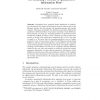Free Online Productivity Tools
i2Speak
i2Symbol
i2OCR
iTex2Img
iWeb2Print
iWeb2Shot
i2Type
iPdf2Split
iPdf2Merge
i2Bopomofo
i2Arabic
i2Style
i2Image
i2PDF
iLatex2Rtf
Sci2ools
128
click to vote
ESORICS
2010
Springer
2010
Springer
On Bounding Problems of Quantitative Information Flow
Abstract. Researchers have proposed formal definitions of quantitative information flow based on information theoretic notions such as the Shannon entropy, the min entropy, the guessing entropy, and channel capacity. This paper investigates the hardness of precisely checking the quantitative information flow of a program according to such definitions. More precisely, we study the "bounding problem" of quantitative information flow, defined as follows: Given a program M and a positive real number q, decide if the quantitative information flow of M is less than or equal to q. We prove that the bounding problem is not a k-safety property for any k (even when q is fixed, for the Shannon-entropy-based definition with the uniform distribution), and therefore is not amenable to the self-composition technique that has been successfully applied to checking non-interference. We also prove complexity theoretic hardness results for the case when the program is restricted to loop-free boo...
ESORICS 2010 | Information Theoretic Notions | Quantitative Information Flow | Security Privacy | Shannon Entropy |
Related Content
| Added | 09 Nov 2010 |
| Updated | 09 Nov 2010 |
| Type | Conference |
| Year | 2010 |
| Where | ESORICS |
| Authors | Hirotoshi Yasuoka, Tachio Terauchi |
Comments (0)

